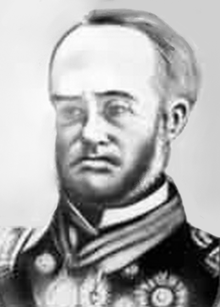Jacinto Roque de Sena Pereira

Jacinto Roque de Sena Pereira (1784; Lisbon – June 28, 1850; Rio de Janeiro) was a Portuguese sailor notable for his service to the Portuguese-Brazilian monarchy and later the Empire of Brazil.
His naval career culminated with a period of squadron command. For nearly a decade he was in charge of a squadron on the Uruguay River, using the schooner Oriental as his flagship. He prepared for the Portuguese invasion of 1816, which resulted in the defeat of troops led by José Gervasio Artigas and the institution of the Provincia Cisplatina as a Portuguese version of the Banda Oriental. He was considered a consummate planner, especially in the area of combined operations with land forces. His personality, education, and intelligence led him to be involved in a diverse activities, such as diplomacy.
Similar to many Portuguese soldiers active in the Provincia Cisplatina, he took a wife from the region, marrying Eugenia Gadea Paredes of the Soriano Department.
During the Cisplatine War, he was named commander of the Third Division, the Brazilian naval squadron in the Uruguay River. He suffered a major defeat in the hands of William Brown in the Battle of Juncal, after which he was taken prisoner. After refusing to give an oath of submission, he succeeded in escaping, and in 1829 he was one of those who entered the plaza of Montevideo as a result of the Preliminary Peace Convention.
He died extremely poor, at the age of 66.
.svg.png)